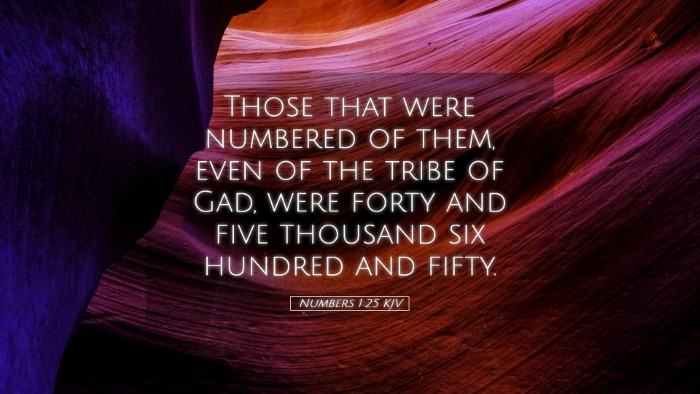Commentary on Numbers 1:25
Bible Verse: "Those that were numbered of them, even of the tribe of Dan, were threescore and two thousand and seven hundred." (Numbers 1:25)
Contextual Overview
Numbers 1:25 is part of the wider narrative in the Book of Numbers, where God commands Moses to take a census of the Israelites as they prepare to enter the Promised Land. This verse specifies the number of men of military age in the tribe of Dan, highlighting the importance of each tribe in the collective identity of the nation of Israel. The tribe of Dan, being the sixth in order of enumeration, plays a significant part in the overall structure and organization of the Israelite community.
Insights from Commentaries
Matthew Henry's Commentary
Matthew Henry emphasizes the significance of the census as a divine directive to organize the Israelite people. He notes that the population of every tribe was counted, which demonstrates that God takes account of His people and their readiness to serve. In discussing the tribe of Dan, he points out that their number, 62,700, indicates not only their strength but also their role in Israel's military capacity.
He further comments on the implications of numbering, suggesting that it reflects God's providence over His people, and prepares them for their journey and conquest of Canaan. Each tribe’s proportion not only indicates their strength but also their responsibility in the unfolding plan of God for Israel.
Albert Barnes' Notes on the Bible
Albert Barnes provides detailed insights into the genealogical and tribal significance of Dan. He explains that Dan was one of the sons of Jacob and represents a vital segment of the nation of Israel. Barnes points out that Dan's numbers show a healthy population, reinforcing the tribe's importance in the collective identity of Israel.
Barnes also notes that Dan's role in future events—such as their association with idolatry and the prophetic implications found in Revelation—is prefigured in their census. This foresight serves as a theological reflection on how current statistics in the tribe relate to their future spiritual condition.
Adam Clarke's Commentary
Adam Clarke delves into the literal and numerical significance of Dan's count. He provides a breakdown of the processes of the census and draws attention to the meticulous nature of the task, conveying a view of God who is deeply concerned with details. Clarke notes that being among the smaller tribes, Dan's representation is nonetheless critical for Israel's balance and military organization.
Moreover, Clarke expands on the spiritual lessons to be learned from this numbering, indicating the importance of accountability and unity within the body of believers. He posits that just as God numbers His people, so too should we recognize the unique contributions and roles of each individual within the community of faith.
Theological Implications
The counting of the tribe of Dan not only serves practical purposes but also embodies broader theological themes such as:
- Divine Order: The structure and organization outlined through this census reflect God's nature as a God of order, imbuing His people with a sense of purpose and structure for their communal and covenantal identity.
- Identity and Community: The number belonging to each tribe reminds us of the importance of community within the faith. Each tribe represents unique attributes and roles that contribute to the richness of the nation of Israel.
- Preparation for Mission: This census is ultimately a preparatory step for the mission of conquest. The numbers highlight the readiness of Israel to fulfill God's promise, thus drawing attention to the church's mission today and the need for active engagement in God's work.
Practical Applications
For pastors, students, and theologians, Numbers 1:25 encourages reflection on the following practical applications:
- Community Engagement: Highlight the importance of knowing and valuing each member within your congregation. Just as God numbered the tribes, we should recognize each individual’s unique contribution.
- Leadership and Accountability: Establishing accountability mechanisms within church leadership can echo the structured leadership seen in Israel. This can foster a sense of trust among congregants.
- Spiritual Preparedness: Emphasize preparation in the life of believers. Just as Israel prepared for battle, believers today must be prepared for spiritual warfare through prayer, education, and community support.
Conclusion
In summary, Numbers 1:25 offers profound insights that extend beyond mere numerical data. It invites contemplation on God’s meticulous care for His people, the significance of communal identity, and the importance of preparation for the journey ahead. As we engage with this text, may we be inspired to honor our community, uphold accountability, and pursue our mission with vigor and faithfulness.


